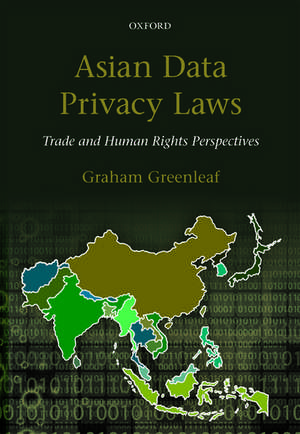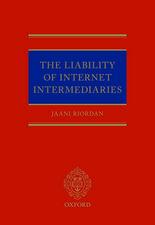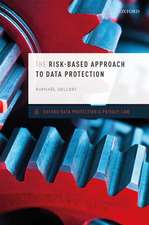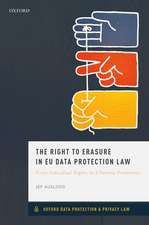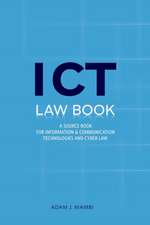Asian Data Privacy Laws: Trade & Human Rights Perspectives
Autor Graham Greenleafen Limba Engleză Hardback – 16 oct 2014
Preț: 932.84 lei
Preț vechi: 1247.66 lei
-25% Nou
Puncte Express: 1399
Preț estimativ în valută:
178.50€ • 186.75$ • 148.28£
178.50€ • 186.75$ • 148.28£
Carte tipărită la comandă
Livrare economică 24-29 martie
Preluare comenzi: 021 569.72.76
Specificații
ISBN-13: 9780199679669
ISBN-10: 0199679665
Pagini: 622
Dimensiuni: 183 x 253 x 41 mm
Greutate: 1.24 kg
Editura: OUP OXFORD
Colecția OUP Oxford
Locul publicării:Oxford, United Kingdom
ISBN-10: 0199679665
Pagini: 622
Dimensiuni: 183 x 253 x 41 mm
Greutate: 1.24 kg
Editura: OUP OXFORD
Colecția OUP Oxford
Locul publicării:Oxford, United Kingdom
Recenzii
In a fast-changing area of research, Graham Greenleaf has provided an invaluable reference work. To those interested in getting up to speed on specific jurisdictions, the survey chapters offer quick but thorough introductions to the laws in place. More importantly, however, his assessment of the various Asian jurisdictions highlights the experimentation and innovation that has characterized legal developments in the last decade or so.
[...] data privacy laws are being enacted at an ever faster rate with most of this growth in recent years occurring outside Europe, North America, and other Western spheres. There is only a relatively small amount of scholarship dedicated to mapping this non-Western growth ... Asian Data Privacy Laws: Trade and Human Rights Perspectives is the highpoint so far of this documentary effort. It is also a superb confirmation of his status as one of the world's leading experts on law concerning protection of privacy and personal data.... The book is thus essential reading for anyone who wants to gain a thorough understanding of the nature of data privacy law as a global phenomenon ... it will stand as a truly classic study in its field for many years to come.
Greenleaf's comprehensive and authoritative survey is the first work to examine data privacy laws across Asia in such detail, with an in-depth analysis of data privacy authorities and their powers in nine Asian countries and a lighter review of 20 more, as well as the international context in which these laws have developed, common themes among them, regional trends and possible futures. Its keenest readers will be academics, regulators and policy-makers in the areas of data protection and privacy law, with legal practitioners in the Asian region and beyond also in line. But anyone looking to see how the Asian century is manifesting in the area of privacy protection, including many in the technology and communications sector, will also find something of interest among the mass of detail on individual regimes or in the birds-eye view of the historical, cultural and legal context.
Greenleaf's analyses and treatment of privacy law in the Asian region provides academic insights and inspiration for well comparative privacy law researches to be developed in other non-European countries particularly in the Middle East, Latin America and Africa where data privacy policies are gaining momentum...I strongly reccomend the book.
Professor Graham Greenleaf's Asian Data Privacy Laws: Trade and Human Rights Perspectives is the only comprehensive book available that examines and aggregates the privacy laws of countries across Asia. This is important because on an international level, Asian privacy law is relatively underdeveloped when compared with the privacy law of other regions including the Americas and Europe. With the rise of Asia as an economic and technological powerhouse, Asian privacy laws are becoming increasingly crucial to any serious study of international privacy law It is impossible to divine exactly how Asian privacy law will develop, but with this treatise, Greenleaf has created a laudable resource for privacy scholars in the U.S. and abroad.
This comprehensive book fills a gap for Data Privacy in Asia. The book is a useful guide not just for lawyers, but also for academic and policy-makers and general readers. It sheds light on the many facets of international and regional data privacy law with a focus in Asia, using clear, concise and accessible language It is a valuable contribution to the current debate on the international movement to enact data protection laws and a must-have for anyone interested in the global aspect of data protection.
In his fastidious treatment of privacy and data protection laws in the region surrounding Australia, Graham Greenleaf has assembled an amazing conspectus. As he points out, this is not only essential knowledge for human rights lawyers and civil society. It is also vital that lawyers and policymakers concerned with the growth of international and regional trade should be aware of the expanding regulation that is already in place and is advancing every day.
The breadth and depth of this book is most impressive. For anyone needing to provide privacy advice about an Asian country from afar, this book is a great resource. As good as the national law chapters are, I found the introductory and concluding chapters even better. All of [Greenleaf's] judgements seem right. Certainly, no one is better equipped to make them.
[Greenleaf] has now compiled what must be the definitive work on the subject of Asian privacy and data protection, This compendious but highly readable book is valuable not only for the sheer information provided about privacy regulation in Asia, but for its commentary on laws, practice, contexts, trajectories of change, and issues such as standardisation and relations with the rest of the world of privacy protection. It is hoped that future editions of this book will examine it in the light of unfolding experience.
Rich in legal and political detail, and comprehensive in scope, Graham Greenleaf's new book is an important reminder of the global reach of contemporary data privacy law. It stands as a model for the comparative analysis of data protection policy, not only in Asia, but elsewhere as well.
He provides insightful analysis of the development of each country's data privacy laws, based on his in-depth understanding of the history and political, economic, social and historical background of each country. Further, given that data privacy laws are quite new and recently developed in most of Asian countries and that there are no sufficient database thereon, his achievement is more amazing in this respect. Particularly from the perspective of a privacy law specialist in South Korea, where its data privacy laws and regulations keep radically changing and are complicated, I cannot but highly praise his insightful analysis of the fundamental reasons and momentums of the changes in Korea.
Data privacy law has become a topic of global concern, and the Asia-Pacific region is the source of many of the most interesting developments in recent years. Professor Greenleaf's book is a remarkable work of privacy law and comparative law scholarship, and both gives much detailed and useful information on the specifics of national laws in Asian countries, and provides a high-level analysis of the trends that they evidence. It will be a mandatory part of the bookshelf of anyone interested in the global aspects of data protection.
Professor Greenleaf has done a great service to privacy scholarship by publishing this thorough analysis of the data privacy approaches and laws throughout the Asian region. Professor Greenleaf has deep roots in the region and is ideally placed to describe and critique these developments. His book does not merely describe these laws but places them in an historical, cultural and legal context that readers from both within and beyond the region will find insightful and useful.
Graham Greenleaf has thought more and more deeply about data protection and privacy laws in Asia than most scholars or practitioners. This masterful volume offers detailed studies of the key jurisdictions as well as thoughtful - and thought-provoking - analysis of regional trends and possible futures. The rise of mass surveillance has led to a great deal of pessimism in this field, but Professor Greenleaf offers a cautiously optimistic assessment of the role law can play in counterbalancing government and corporate interests in defence of privacy.
This volume will help everyone who processes personal data anywhere in Asia to understand the obligations that accompany the processing. Everyone outside of Asia who does business with Asian consumers - or who advises those who do - needs this book.
[...] data privacy laws are being enacted at an ever faster rate with most of this growth in recent years occurring outside Europe, North America, and other Western spheres. There is only a relatively small amount of scholarship dedicated to mapping this non-Western growth ... Asian Data Privacy Laws: Trade and Human Rights Perspectives is the highpoint so far of this documentary effort. It is also a superb confirmation of his status as one of the world's leading experts on law concerning protection of privacy and personal data.... The book is thus essential reading for anyone who wants to gain a thorough understanding of the nature of data privacy law as a global phenomenon ... it will stand as a truly classic study in its field for many years to come.
Greenleaf's comprehensive and authoritative survey is the first work to examine data privacy laws across Asia in such detail, with an in-depth analysis of data privacy authorities and their powers in nine Asian countries and a lighter review of 20 more, as well as the international context in which these laws have developed, common themes among them, regional trends and possible futures. Its keenest readers will be academics, regulators and policy-makers in the areas of data protection and privacy law, with legal practitioners in the Asian region and beyond also in line. But anyone looking to see how the Asian century is manifesting in the area of privacy protection, including many in the technology and communications sector, will also find something of interest among the mass of detail on individual regimes or in the birds-eye view of the historical, cultural and legal context.
Greenleaf's analyses and treatment of privacy law in the Asian region provides academic insights and inspiration for well comparative privacy law researches to be developed in other non-European countries particularly in the Middle East, Latin America and Africa where data privacy policies are gaining momentum...I strongly reccomend the book.
Professor Graham Greenleaf's Asian Data Privacy Laws: Trade and Human Rights Perspectives is the only comprehensive book available that examines and aggregates the privacy laws of countries across Asia. This is important because on an international level, Asian privacy law is relatively underdeveloped when compared with the privacy law of other regions including the Americas and Europe. With the rise of Asia as an economic and technological powerhouse, Asian privacy laws are becoming increasingly crucial to any serious study of international privacy law It is impossible to divine exactly how Asian privacy law will develop, but with this treatise, Greenleaf has created a laudable resource for privacy scholars in the U.S. and abroad.
This comprehensive book fills a gap for Data Privacy in Asia. The book is a useful guide not just for lawyers, but also for academic and policy-makers and general readers. It sheds light on the many facets of international and regional data privacy law with a focus in Asia, using clear, concise and accessible language It is a valuable contribution to the current debate on the international movement to enact data protection laws and a must-have for anyone interested in the global aspect of data protection.
In his fastidious treatment of privacy and data protection laws in the region surrounding Australia, Graham Greenleaf has assembled an amazing conspectus. As he points out, this is not only essential knowledge for human rights lawyers and civil society. It is also vital that lawyers and policymakers concerned with the growth of international and regional trade should be aware of the expanding regulation that is already in place and is advancing every day.
The breadth and depth of this book is most impressive. For anyone needing to provide privacy advice about an Asian country from afar, this book is a great resource. As good as the national law chapters are, I found the introductory and concluding chapters even better. All of [Greenleaf's] judgements seem right. Certainly, no one is better equipped to make them.
[Greenleaf] has now compiled what must be the definitive work on the subject of Asian privacy and data protection, This compendious but highly readable book is valuable not only for the sheer information provided about privacy regulation in Asia, but for its commentary on laws, practice, contexts, trajectories of change, and issues such as standardisation and relations with the rest of the world of privacy protection. It is hoped that future editions of this book will examine it in the light of unfolding experience.
Rich in legal and political detail, and comprehensive in scope, Graham Greenleaf's new book is an important reminder of the global reach of contemporary data privacy law. It stands as a model for the comparative analysis of data protection policy, not only in Asia, but elsewhere as well.
He provides insightful analysis of the development of each country's data privacy laws, based on his in-depth understanding of the history and political, economic, social and historical background of each country. Further, given that data privacy laws are quite new and recently developed in most of Asian countries and that there are no sufficient database thereon, his achievement is more amazing in this respect. Particularly from the perspective of a privacy law specialist in South Korea, where its data privacy laws and regulations keep radically changing and are complicated, I cannot but highly praise his insightful analysis of the fundamental reasons and momentums of the changes in Korea.
Data privacy law has become a topic of global concern, and the Asia-Pacific region is the source of many of the most interesting developments in recent years. Professor Greenleaf's book is a remarkable work of privacy law and comparative law scholarship, and both gives much detailed and useful information on the specifics of national laws in Asian countries, and provides a high-level analysis of the trends that they evidence. It will be a mandatory part of the bookshelf of anyone interested in the global aspects of data protection.
Professor Greenleaf has done a great service to privacy scholarship by publishing this thorough analysis of the data privacy approaches and laws throughout the Asian region. Professor Greenleaf has deep roots in the region and is ideally placed to describe and critique these developments. His book does not merely describe these laws but places them in an historical, cultural and legal context that readers from both within and beyond the region will find insightful and useful.
Graham Greenleaf has thought more and more deeply about data protection and privacy laws in Asia than most scholars or practitioners. This masterful volume offers detailed studies of the key jurisdictions as well as thoughtful - and thought-provoking - analysis of regional trends and possible futures. The rise of mass surveillance has led to a great deal of pessimism in this field, but Professor Greenleaf offers a cautiously optimistic assessment of the role law can play in counterbalancing government and corporate interests in defence of privacy.
This volume will help everyone who processes personal data anywhere in Asia to understand the obligations that accompany the processing. Everyone outside of Asia who does business with Asian consumers - or who advises those who do - needs this book.
Notă biografică
Graham Greenleaf is a Professor of Law at the University of New South Wales, Australia, where he specialises in the relationships between information technology and law. He is a co-founder and Co-Director of the free-access Internet law service, the Australasian Legal Information Institute. In 2010 he took the lead in establishing the Asian Privacy Scholars Network. He was General Editor of the monthly Privacy Law and Policy Reporter 1994-2006, and since then has been Asia-Pacific Editor for Privacy Laws & Business International Report. He co-edited Global Privacy Protection (Edward Elgar, 2008) with J Rule. In 2010 he was made a member of the Order of Australia (AM) for his contributions to advancing free access to legal information and to the protection of privacy.
